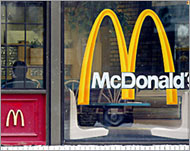British lab confirms US mad cow case
A British veterinary laboratory has confirmed that the United States has its first case of mad cow disease.

The US Department of Agriculture had already confirmed that brain specimens from a suspect animal in Washington state tested positive for BSE at an Iowa lab.
But the USDA sent specimens to a lab in Britain for confirmation, since Britain has had far more experience with the disease.
“The test samples were received at the laboratory in Weybridge, England, early Christmas morning,” the USDA said on Thursday.
“The UK veterinary pathologists concur with our interpretation of the December 22 positive test conducted by USDA pathologists at the National Veterinary Services Laboratory in Ames, Iowa.”
Beef imports barred
|
“For us to recover our export market, they are going to have to do more extensive testing” Michael Hansen, |
The USDA added: “The Weybridge lab will conduct a series of additional confirmatory tests and we anticipate they will be consistent with the earlier findings.”
At least 23 countries, including top importers Mexico and Japan, have now barred US beef imports, a massive blow to the multi-billion-dollar industry that employs one million people.
Domestic cattle prices and fast food industry shares have taken a beating in the wake of the scare, and activists have launched appeals for tougher food safety standards.
However, government officials have promised Americans their holiday beef is safe, saying the mad cow case unearthed posed a negligible health threat.
US Agriculture Secretary Ann Veneman said authorities were doing all they could to protect consumers, and that as the spinal cord and brain of the infected cow had not entered the food chain the impact of the case should be isolated.
Prevention measures
The US beef industry, hoping to avoid the fate of its European counterpart which was savaged by the disease, mobilised to stop further potential cases entering the food chain.
Meat processing firm Vern’s Moses Lake Meats, of Moses Lake, Washington state, has recalled about 20 beef carcasses that may have been exposed to raw tissue containing BSE.
And the farm where the four-and-a-half-year old infected cow was kept before slaughter quarantined its remaining 4000 head of cattle.
“We export about 10% of what we produce, so obviously that will probably have some impact on the market. At this point it’s too early to determine how much,” Veneman said.
Activist groups called on Washington to impose tougher standards to ensure the safety of the food supply.
Stringent testing
Michael Hansen, from the advocacy group Consumers Union, said the United States should adopt the same stringent testing as Europe and Japan.
Although 37 million cows were slaughtered in the US last year, only 20,000 were tested for mad cow disease, fewer than France tests each month.
 |
|
McDonald’s stock fell after word |
“For us to recover our export market, they are going to have to do more extensive testing,” Hansen said.
Some lawmakers plan to introduce legislation to raise standards to detect mad cow disease.
Creutzfeldt-Jacob disease
“When we sit down at the dinner table, we should know that what we are eating is as safe as we can make it,” Senator Dick Durbin said.
The only previous outbreak of mad cow disease in North America was a single case at a farm in Alberta, Canada, in May.
Mad cow disease has been linked to a form of the fatal brain-wasting Creutzfeldt-Jakob disease that affects humans.
Ninety percent of the beef produced in the United States is consumed domestically.